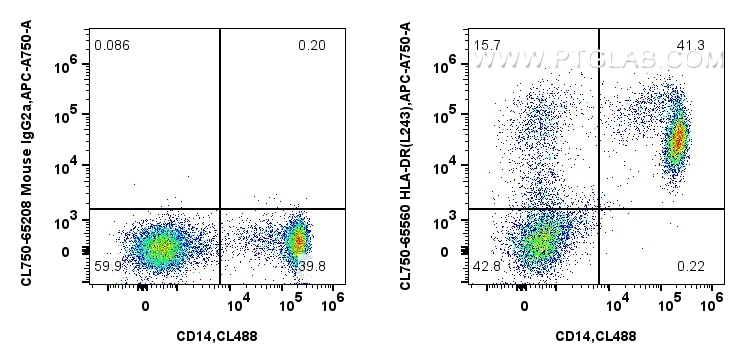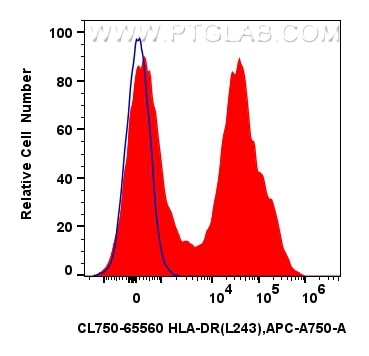HLA-DR Rekombinanter Antikörper
HLA-DR Rekombinant Antikörper für FC
Wirt / Isotyp
Maus / IgG2a
Getestete Reaktivität
human
Anwendung
FC
Konjugation
CoraLite® Plus 750 Fluorescent Dye
CloneNo.
L243
Kat-Nr. : CL750-65560
Synonyme
Geprüfte Anwendungen
| Erfolgreiche Detektion in FC | humane PBMCs |
Empfohlene Verdünnung
| Anwendung | Verdünnung |
|---|---|
| This reagent has been pre-titrated and tested for flow cytometric analysis. The suggested use of this reagent is 5 ul per 10^6 cells in a 100 µl suspension or 5 ul per 100 µl of whole blood. | |
| Sample-dependent, check data in validation data gallery | |
Produktinformation
CL750-65560 bindet in FC HLA-DR und zeigt Reaktivität mit human
| Getestete Reaktivität | human |
| Wirt / Isotyp | Maus / IgG2a |
| Klonalität | Rekombinant |
| Typ | Antikörper |
| Immunogen | Human lymphoblastoid B-cell line RPMI 8866 |
| Vollständiger Name | major histocompatibility complex, class II, DR alpha |
| Berechnetes Molekulargewicht | 254 aa, 29 kDa |
| GenBank-Zugangsnummer | BC032350 |
| Gene symbol | HLA-DRA |
| Gene ID (NCBI) | 3122 |
| Konjugation | CoraLite® Plus 750 Fluorescent Dye |
| Excitation/Emission maxima wavelengths | 755 nm / 780 nm |
| Form | Liquid |
| Reinigungsmethode | Protein-A-Reinigung |
| Lagerungspuffer | PBS with 0.09% sodium azide |
| Lagerungsbedingungen | Store at 2-8°C. Avoid exposure to light. Stable for one year after shipment. |
Hintergrundinformationen
HLA-DR is a member of MHC class II molecules encoded by the human leukocyte antigen complex on the region 6p21.31 of chromosome 6. HLA-DR is composed of two non-covalently associated transmembrane glycoproteins (the α and β chains), and is primarily expressed on B lymphocytes, monocytes, dendritic cells and thymic epithelial cells (PMID: 33125816). HLA-DR participates in the antigen presentation to CD4+ or CD8+ T cells and is postulated as a general biomarker of sepsis-induced immunosuppression (PMID: 28199206, 32421903).
Protokolle
| PRODUKTSPEZIFISCHE PROTOKOLLE | |
|---|---|
| FC protocol for CL Plus 750 HLA-DR antibody CL750-65560 | Download protocol |
| STANDARD-PROTOKOLLE | |
|---|---|
| Klicken Sie hier, um unsere Standardprotokolle anzuzeigen |



